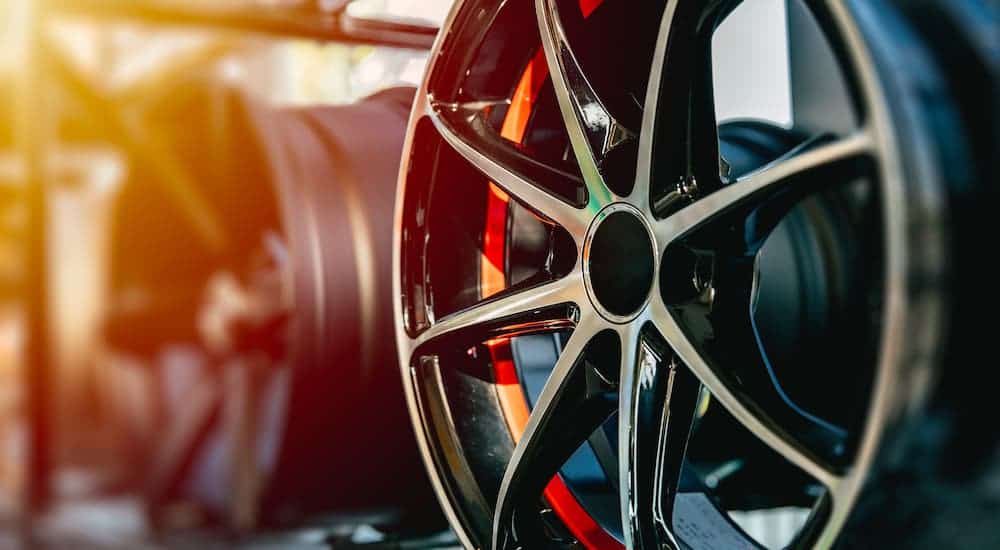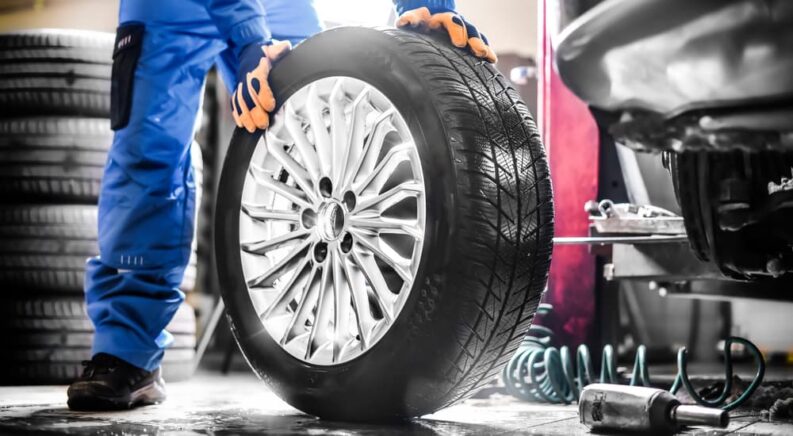Wheels come in all shapes and sizes, from run-of-the-mill designs straight from the factory to custom styles that can turn a vehicle into a one-of-a-kind work of automotive art. While style is certainly important, so is construction, which is why all drivers should familiarize themselves with the different types of wheels on offer.
Wheels are typically divided into two categories: alloy and steel. They each have their pros and cons, but ultimately, the choice comes down to what type of driving you plan on doing. If you’re sticking to paved surfaces and looking to maximize fuel economy, alloy wheels are a popular choice thanks to their low price and lightweight construction. Steel wheels are the more heavy-duty option, allowing drivers to tackle almost any obstacle the road can throw at them. Unlike alloy wheels, steel wheels are less prone to cracking and bending, making them the go-to choice for trucks, vans, commercial vehicles, and even police cruisers.
But choosing between alloy and steel isn’t the only decision you’ll have to make when shopping for new tires. These terms describe the material the wheels are made from, but the way they’re created can have just as much of an impact on their performance, cost, and aesthetics. Most alloy and steel wheels you’ll find on the market are produced using one of two techniques: forging and casting. So, what are the differences between forged and cast wheels? Join us as we answer that question, look into some of the pros and cons between forged and cast wheels, and see which manufacturing method best fits your unique needs as a driver.
What Are Cast Wheels?
Let’s start with cast wheels, which represent the more popular — and more affordable — of the two options. The process of casting usually involves pouring molten, 1,200-degree aluminum into a wheel-shaped mold, though a vacuum can also be used to draw the metal into the mold. The vacuum approach results in a denser wheel, allowing the molten aluminum to fill the mold more quickly than the gravity-fed approach. Once the molten aluminum cools, it is released from the mold, machined, drilled, and trimmed into its final form. This is by far the fastest and least expensive way of producing wheels, which is the major reason for its popularity.
Pros
As we mentioned, cost-savings are one of the biggest advantages of cast wheels. The casting process is relatively quick and simple, allowing wheel manufacturers to create multiple wheels with one pour given a large enough mold. This simple production process and the fact that so many wheels can be produced in a typical workday means cast wheels will almost always be cheaper than their forged counterparts. How much cheaper? The average basic aluminum alloy wheel retails for just north of $100, while forged rims can cost as much as $1,000 a pop. Thanks to the fact that they’re so easy to produce, the market is filled with cast alloy wheels of all shapes, sizes, materials, and designs. In addition to the wide selection, cast wheels are also relatively easy to source, allowing drivers to skip the wait and get back on the road as soon as possible.
Cons
The major disadvantage of cast wheels comes down to something known as porosity. Porosity describes the inconsistencies that can occur in a cast object as the molten aluminum alloy begins to cool and harden. These inconsistencies can lead to all sorts of issues, like oxidation and cracking, that can result in all-out wheel failure. In order to minimize the effects of porosity, wheel manufacturers will often use more material to produce the wheels, resulting in a heavier product that can feel a little sluggish on the road. Cast wheels can be up to 25 to 30 percent heavier than a forged wheel of the same size and strength, a statistic that drives home just how impactful a wheel’s construction method can be. If you plan on regularly taking your car out on the track or competing in any level of racing, cast wheels are not the way to go. Some light track and street antics are usually fine, but using a cast wheel on the track will reduce performance and increases the likelihood of cracked or bent wheels.
What Are Forged Wheels?
Unlike cast wheels, forged wheels start with a large, square chunk of solid metal known as a billet. This billet is heated and exposed to extreme pressure that compresses the material, forming it into a circular shape without it ever reaching a molten state. Once the material goes through the forging process, it is machined into a more wheel-like shape, usually through the use of Computer Aided Design (CAD) and Computer Numerical Control (CNC) routing.
This computer-controlled approach allows wheel manufacturers to be a little more creative when it comes to design complexity, creating bespoke wheels with intricate designs that can be as much of a work of art as the vehicle they’re propping up. When it’s fresh out of the forging process, a wheel might weigh as much as 100 lbs, but much of the material is slowly carved away through the machining process, resulting in a final product that can be as light as 18 lbs for an 18-inch wheel.
Forged wheels come in two flavors: monoblock and modular. Monoblock wheels are just what they sound like: a full wheel forged and machined out of a single piece of metal. Modular wheels, on the other hand, see the rim and spokes produced separately and welded together towards the end of the process, resulting in a more affordable but less sturdy wheel.
Pros
The main advantage of forged wheels comes down to their strength and weight. Forging helps to align the grain structure of the alloy itself, resulting in one of the strongest, most durable wheels on the market. Forged wheels are better able to withstand the bumps and bruises that come with regular use, meaning they typically last longer than cast products. The forging process not only makes for a less porous wheel than the casting method but also helps prevent the type of corrosion and oxidation that can lead to premature failure.
The CNC machining process allows forged wheel designers to produce some truly stunning products. From needle-thin spokes and intricate detailing to bold, chunky designs and eye-catching swirls that look like chromed-out whirlpools, you simply can’t beat forging when it comes to creating distinctive wheels.
The forging process results in wheels that are 25 to 30 percent stronger than cast wheels, which can make a big difference when it comes to fuel economy, ride quality, and performance. The fuel economy aspect is pretty obvious: lighter wheels mean a lighter car, which means less power needed to push it down the road. Ride quality is improved thanks to the fact that lighter wheels do a better job of negating bumps in the road, making for a more comfortable ride all around. Less weight also means better handling and acceleration, which is why forged wheels are so popular among performance-minded drivers.
Cons
The only real disadvantage of forged wheels comes down to their price. As we touched on earlier, forged wheels can easily cost as much as $1,000 per wheel, which is a reflection of how time-consuming they are to produce. Forged wheels require a lot more attention to detail to produce, not to mention the pricey CNC and CAD equipment and software needed to produce the precise, intricate designs.
That said, forged wheels might actually be a better value in some cases. Sure, they’ll set you back a pretty penny, but they’ll also last a lot longer and better withstand the abuse of high-performance use. This is even more true when it comes to racing applications. Heading out for a lap on cast wheels can result in an expensive on-track accident that could start to add up once you consider the damage to your vehicle, other nearby vehicles and the potential hospital bill.
While forged wheels boast a number of advantages over their forged cousins, they might not always be the right choice for every driver or vehicle. If merging onto the highway represents the height of your high-performance antics, the performance benefits of forged wheels will likely be lost on your vehicle. That said, there is an aesthetic argument to be made, with forged wheels offering so much more room for experimentation and creativity than cast options.

Two Distinctive Types of Wheels for a Variety of Drivers
If you’re looking to make your ride stand out from the crowd, forged wheels are the way to go, but that sort of notoriety comes at a price. Cast wheels are a great option for drivers of all stripes, representing an affordable, well-rounded option that won’t give you a panic attack when you bump up against a curb. They might not be the lightest wheels on offer and can’t exactly hold their own in some high-speed racing applications, but they’re a great choice for a daily driver, family vehicle, or any other ride that’s simply about getting from point A to point B in one piece.

